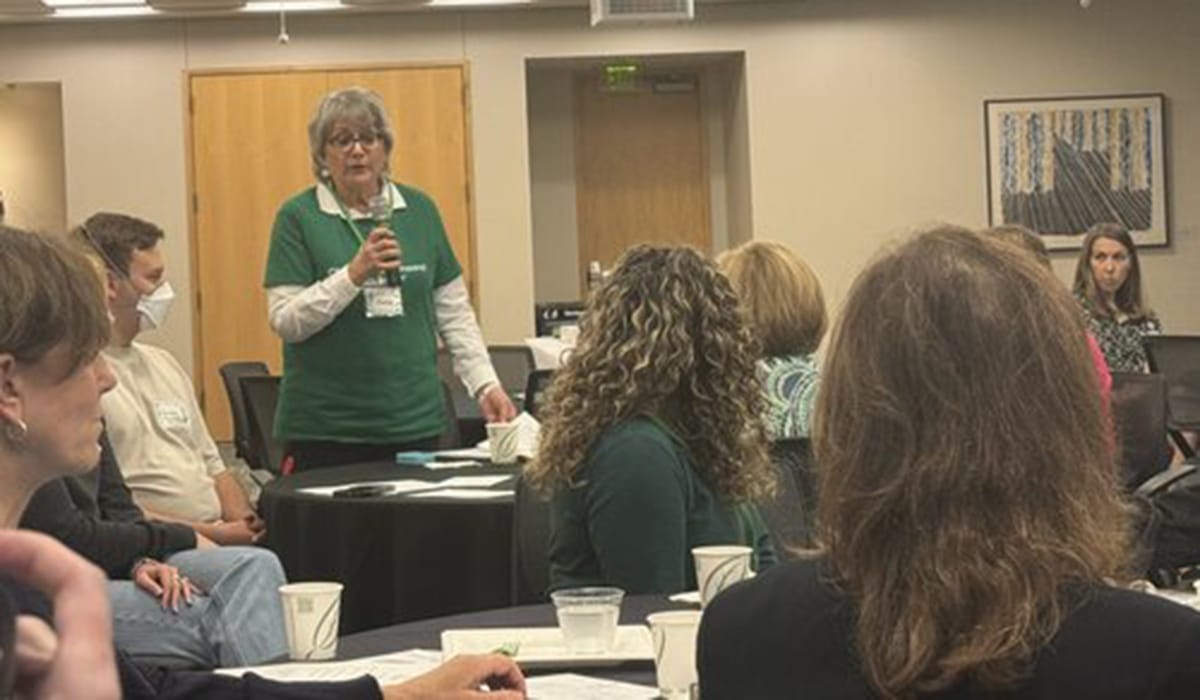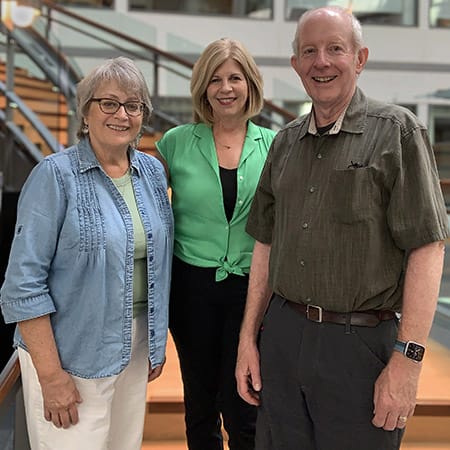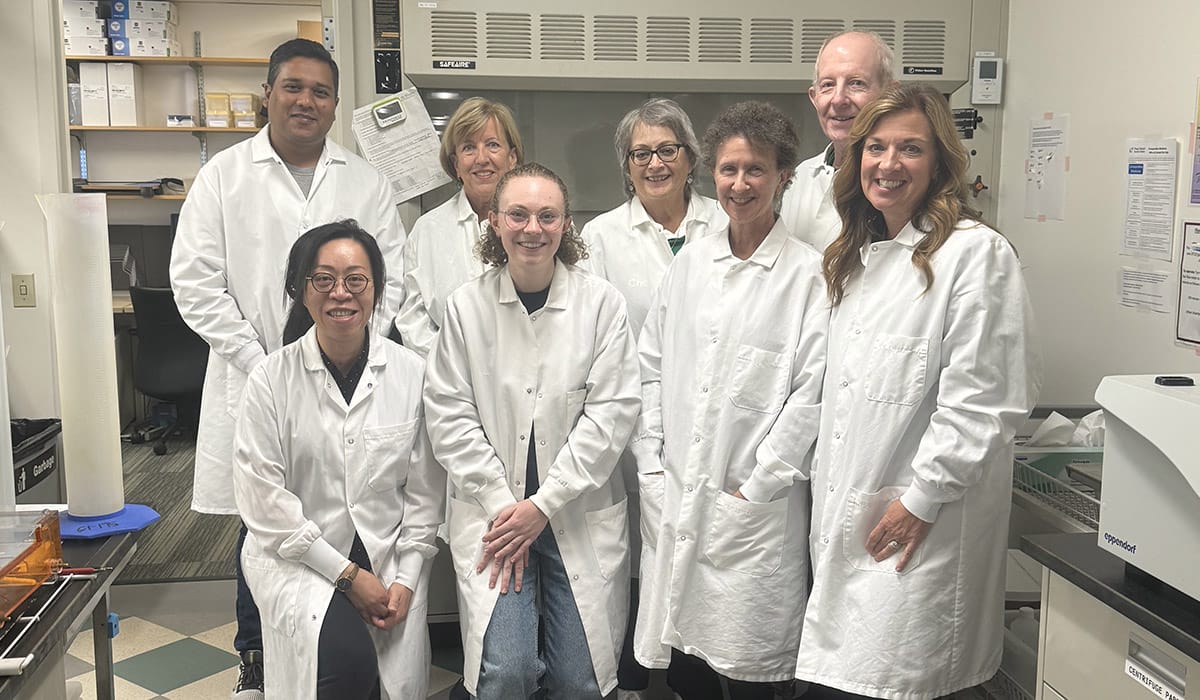A Survivor’s Mission to Light the Way for Cholangiocarcinoma Patients

Meet Daily Point of Light Award honoree Kathy Virgallito. Read her story, and nominate an outstanding volunteer or family as a Daily Point of Light.
In November 2021, Kathy Virgallito received a life-altering diagnosis: cholangiocarcinoma (CCA), a rare and aggressive cancer. While undergoing treatment in 2022, Kathy faced the harsh realities of this disease. But instead of retreating, she found purpose in paving the way for others navigating similar challenges. With determination to light the way for others, Kathy began volunteering with the Cholangiocarcinoma Foundation. She aims to be a voice of understanding, encouragement and empathy to others going through this difficult diagnosis.
As a patient mentor, Kathy provides personalized support to patients across the United States. Through phone calls, texts and emails, she offers a listening ear and practical guidance. Her efforts help patients feel less isolated, more hopeful and better equipped to advocate for themselves. One mentee remarked on how Kathy’s mentorship inspired her to embrace self-affirming activities and take charge of her medical journey.
Kathy’s impact extends beyond one-on-one support. As the team leader for the Greater Seattle CARE Team, she spearheads local efforts to build a supportive community for CCA patients and caregivers. In September 2024, Kathy helped organize the first-ever Greater Seattle Patient and Caregiver Gathering, which drew 27 attendees, including patients, caregivers, medical professionals and researchers. The event elevated the need for and importance of local connections and up-to-date information on treatments and research, also leaving participants eager for more gatherings. Kathy is now planning the next event for February 2025 and working to distribute educational materials to healthcare providers and at health fairs.
Kathy’s advocacy also reaches national levels. As a member of the Cholangiocarcinoma Foundation’s Key Communicators group, she is dedicated to influencing policymakers to secure additional funding for CCA research. Kathy is preparing to meet with legislators and share her personal story to advocate for advancements in treatment and care. Read on to learn more about Kathy’s dedication to making a difference, ensuring that no one facing cholangiocarcinoma feels alone in their journey.

Tell us about your volunteer role.
I have several different ways that I volunteer with the Cholangiocarcinoma Foundation. I first became involved as a patient mentor as part of a program that aims to connect patients with other patients, caregivers with other caregivers and so on. It’s a way to provide some support and empathy for those who are impacted by this cancer. Right now, I’m mentoring two other patients.
The second way I volunteer with the foundation is that I’m the team leader for the Greater Seattle CARE Team. This acronym stands for caring, advocacy, research and education. It’s a way to connect people who are impacted by this disease with a more local support system. This is a rare cancer. There are about 10,000 people who are diagnosed with bile duct cancer, or CCA, every year. You just don’t run into people who also have it. For this team in particular, our responsibility is to connect people with local resources and also to educate medical professionals with information about CCA and the foundation.
And then, the third and newest way I volunteer is through the Cholangiocarcinoma Foundation’s Key Communicators group. We’re continuing the advocacy work but expanding it to national legislative leaders as well. This group is newer, and it was formed to educate legislators at the national level about this disease in order to advocate for increased research funding.
Can you tell us a bit about your personal journey with cholangiocarcinoma?
I was diagnosed with CCA in November of 2021. I’d been feeling great, but some wonky bloodwork led to some additional tests, and I was diagnosed with stage 3 CCA. I was on a regimen of chemotherapy, and had some radiation, which I finished up in November of 2022. Like anyone else who goes through chemo and radiation, I was impacted with some side effects. Since that treatment has been over, I’ve been lucky enough to be stable. That means there’s no progression of the disease.
In 2023, I started to get back to feeling like my old self. I thought, what else can I do? I discovered the Cholangiocarcinoma Foundation’s website and saw that I could ask for a mentor. I got connected with somebody who was great in helping me sort through my experience as a patient. As a result, I thought, I’d like to do that. Maya Angelou has a quote, that seems to me the perfect way to describe why I got involved. She said, “As soon as healing takes place, you go out and heal somebody else.” I didn’t think I’d do great things, but I thought I was the type of person who could do patient mentoring, which I started at the end of 2023. I knew I could provide that type of support, kindness and empathy to somebody else. It’s been a great experience.
Later, I ended up going to their annual conference and found out that there was even more that I could do. That’s what led me to try to do something locally with the Greater Seattle CARE Team. I wanted to let other medical professionals in the area know about the foundation. There are so many resources for the oncologists and patient navigators and nurses. As a result, I connected with two other patients, and last September, we held our first Greater Seattle Patient and Caregiver Gathering. The majority of the attendees were patients and caregivers – most of whom had never met anyone else with this diagnosis. When you bring people like that together, you have an immediate bond. It was a success, and now we’re going to continue that work, because there are more people to reach, more people to educate, more people to connect to the foundation.
Then finally, the foundation asked me to be part of the new Key Communicators group. They’re very conscious that volunteering takes up time, but it’s been very meaningful for me to volunteer with this foundation.
What inspires you to volunteer?
For me, there’s an emotional healing that I’ve seen. When I was first diagnosed, the doctor who gave me this diagnosis told me to go home, get my affairs in order and call hospice. This was three years ago. So many people who get this diagnosis hear that. However, rather than a few months to live, here I am, doing very well three years after diagnosis.
You can imagine that when you’re first diagnosed with something as aggressive and rare as this – and the aggressiveness is what’s so impactful – you have to turn inward for a while, in order to come to grips with the fact that your life could be ending, sometimes even soon. While that didn’t happen for me, what I did emotionally was reach a point where I was able to look beyond myself and try to help others facing something similar. I want my life to be meaningful. I want my life to have a purpose. That’s why it seemed important to volunteer. It gave me a purpose. The people I’d be reaching in my volunteer work might be suffering from anxiety, fear, isolation and loneliness – all the things that can come if they don’t have a support community to help them deal with this diagnosis. Helping provide that is what inspires me. Volunteering was an easy decision to make and an easy shift of my priorities.
What’s been the most rewarding part of your work?
Meeting other patients and caregivers, getting to know them as people, sharing their successes and being with them when the news isn’t so great. That’s it; it’s all about the people.
Most of the mentoring I do is by telephone. These are people who could be anywhere in the country – I don’t often get the chance to meet them one-on-one. This summer, I got the chance to go back to my home state of Ohio. One of my mentees lives there and I got to meet her in person. It was like meeting an old friend. The bond that you make when you talk to other patients, when you have these shared experiences and a similar journey, is a joyful event!

Why is it important for others to get involved with causes they care about?
There are many benefits to volunteering. It has health benefits. It gives you a social outlet. It helps you meet people. When people are volunteering for a cause they believe in, it gives them that sense of purpose. It gives their life some meaning. Especially when people are going through difficult times, at the point they’re able to reach out, it actually helps balance those difficult times with some positivity. When you go outside of yourself, the benefit comes back to you. Many people say they get as much as they give.
Any advice for people who want to start volunteering?
First of all, I think it’s important that people identify a volunteer area that they’d be interested in, that they’d like. It has to be the right match. If you’re volunteering for an organization you don’t have much connection to, eventually you might lose steam. But it’s much better if there’s a good fit with your passion areas. Most organizations are happy to welcome volunteers. My advice is to contact them and ask how you can help, no matter how much or how little time you have to give.
What do you want people to learn from your story?
This cancer is rare so often people feel very isolated and struggle on their own. Navigating diagnosis and treatment can be confusing. By providing information and support, we can empower patients and caregivers as they learn to advocate for themselves.
Also, I want people to see that it doesn’t take much, in terms of time or effort, to make a difference. It takes a little bit of kindness and a little bit of empathy. What you have to offer can make a difference in somebody’s life. I hope that my story can inspire others to consider volunteering some of their own time.
Do you want to make a difference in your community like Kathy? Find local volunteer opportunities.
